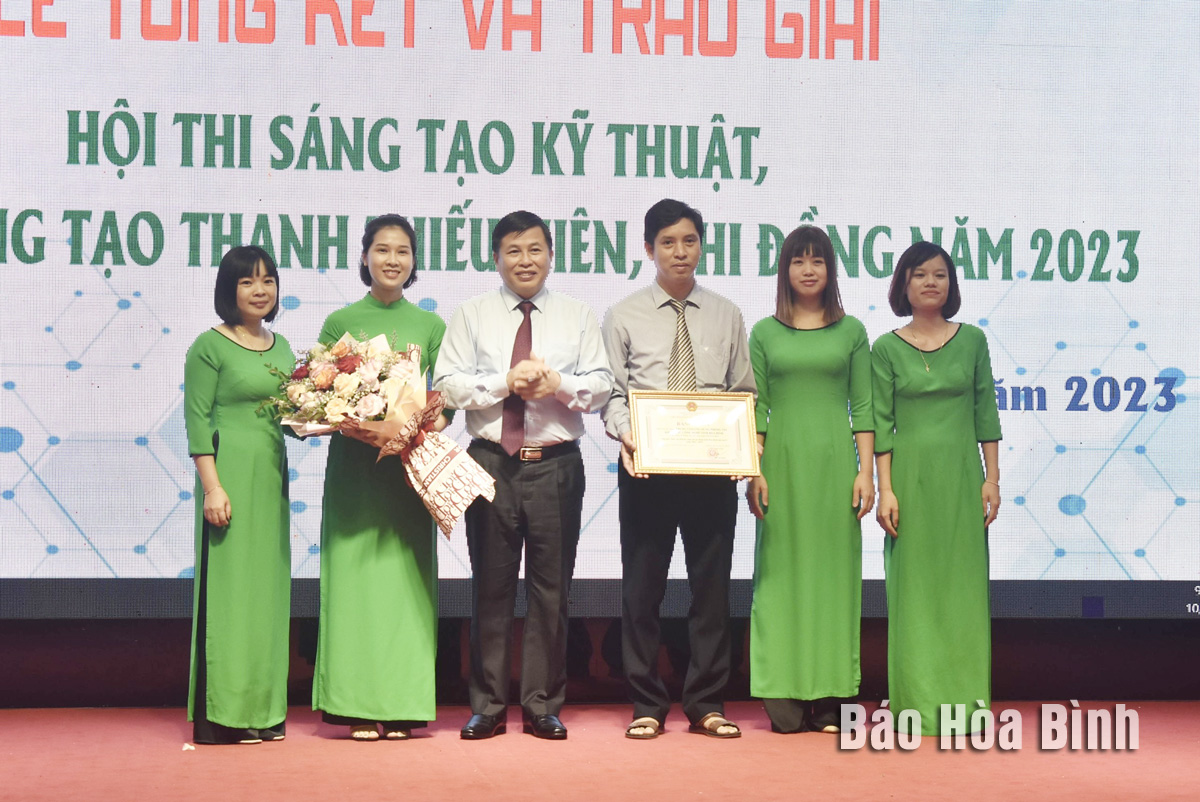
(HBO) – A total of 49 projects were honoured at the awarding ceremony for the 9th Technical Innovation Contest and the 19th Innovation Contest for Youth and Children of Hoa Binh province on October 12.
After two years of launching, the 9th provincial
Technical Innovation Contest received 33 entries, up 12 entries compared to the
previous event, including many solutions with improved quality developed by
local farmers and workers. Meanwhile, the 19th provincial Innovation Contest
for Youth and Children received 129 entries from 10 localities.
One first, two second, seven third, and 20
consolation prizes were presented to the outstanding initiatives of the contest
for youth and children. Meanwhile, one first, two second, two third and five
consolation prizes were handed over to the winners of the technical innovation
contest.
On the occasion, a group of authors from the
provincial centre for science and information technology application was
presented with a certificate of merit from the Chairman of the provincial
People’s Committee.
Addressing the event, Vice Chairman of the
provincial People’s Committee Dinh Cong Su, who is also Chairman of the
provincial Council for Science and Technology, affirmed that the biennial
technical innovation contestaims to promote the innovation emulation
movement, exploit the great innovation potential among local residents, and
constantly promote initiatives and technical improvements, towards
strengthening the application of scientific and technological advances in
production and social life, contributing to implementing socio-economic
development, industrialisation and modernisation goals of the province.
The annual innovation contest for youth and
children has contributed to awakening potential and promoting innovation among
teenagers and children, he added, urging relevant departments, sectors, and
localities to actively apply solutions that won the contests.
At the event, the organising board launched the
10th Technical Innovation Contestin 2024 - 2025 and the 20th Innovation
Contest for Youth and Children in the 2023 – 2024 academic year.
The Standing Board of the Hoa Binh provincial Party Committee has agreed in principle on a proposal by the Standing Board of the Party Committee of Hoa Binh city to gather feedback on the city’s 1:2000 zoning plan, which forms part of its broader urban development strategy.
Hoa Binh province has made notable progress in public administration reform and digital government development, with the satisfaction index among citizens and businesses reaching over 84%, according to recent government evaluations.
Thanks to great efforts by local authorities in recent times, the governance and public administration performance of Mai Chau district has been significantly improved.
In the afternoon of June 6, the Party Committee, the People's Council, the People's Committee and the Fatherland Front of Lac Son district solemnly held a meeting to celebrate the 139th anniversary of the district's founding (1886–2025) and the 79th anniversary of the establishment of the district's Party Committee (1946–2025). There was the attendance of Mr. Bui Van Thang, the Vice Chairman of the Provincial People's Council; Mr. Quach Tat Liem, the Vice Chairman of the Provincial People's Committee; Ms. Dang Bich Ngoc, the Deputy Head of the National Assembly Delegation of the province; as well as the former leaders of the province and district through various periods, who are the natives of the district.
Implementing the Politburo’s Resolution No. 57-NQ/TW on breakthroughs in science – technology, innovation, and digital transformation is a golden opportunity for the northern mountainous province of Hoa Binh to renew growth model, improve competitive edge and shorten digital gap.
Resolution 57-NQ/TW, issued by the Politburo on December 22, 2024, identifies sci-tech, innovation, and digital transformation as strategic breakthroughs to build a developed and prosperous nation. In Hoa Binh province, this spirit is not just a slogan, it’s being put into action through concrete initiatives that form a "new development triangle”: digital citizenship, digital economy, and digital administration.


